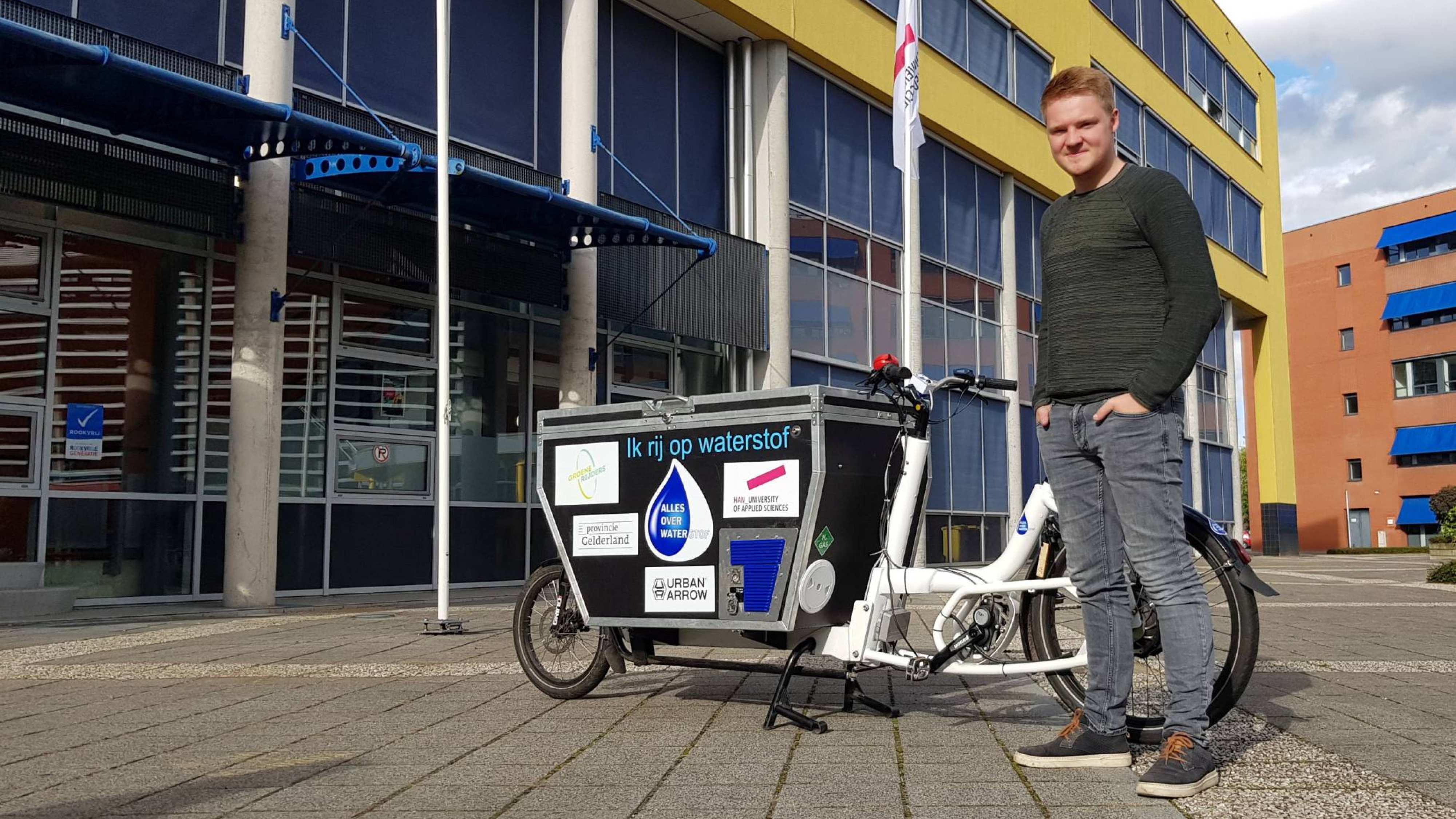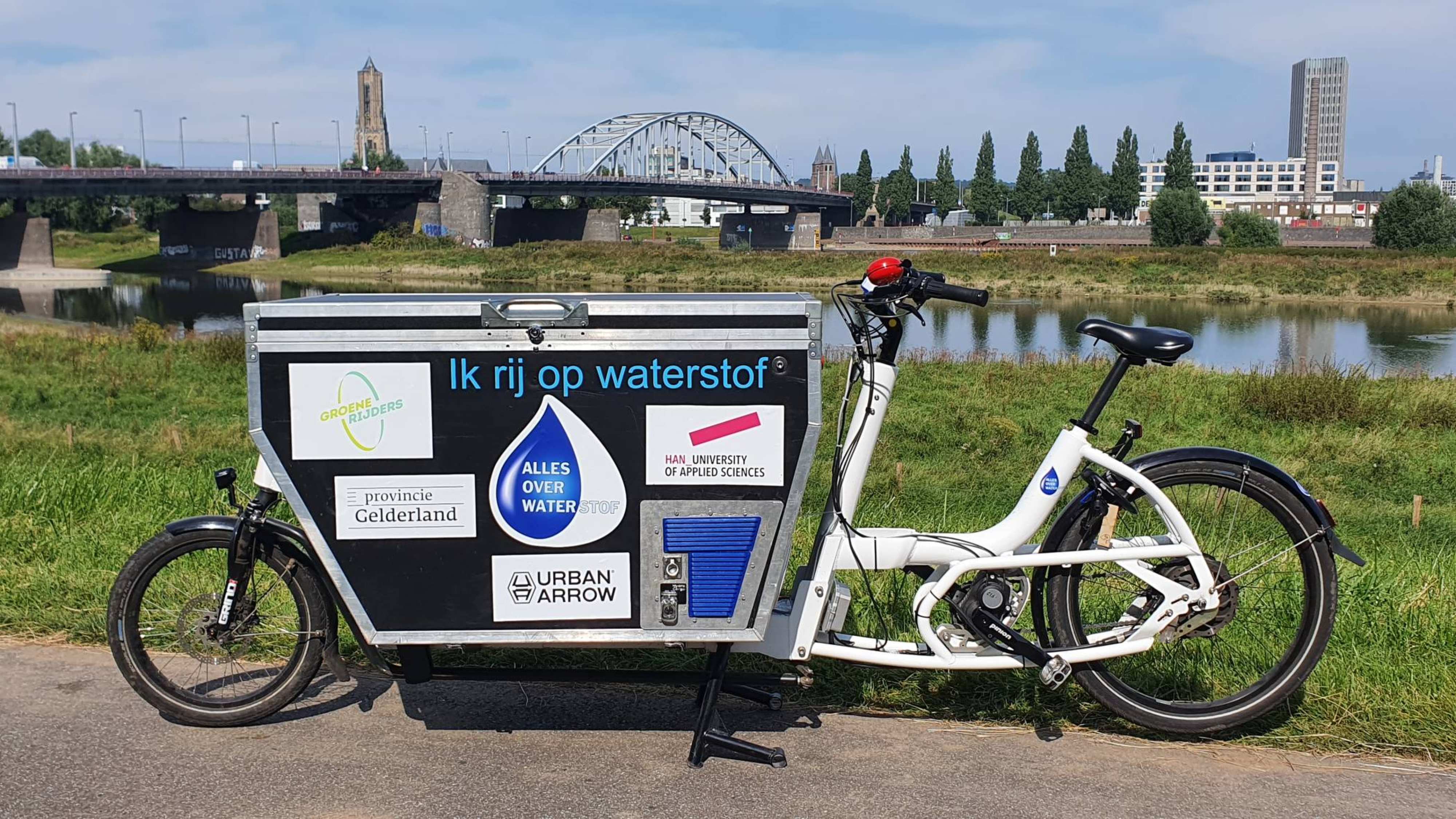Students unveil prototype Dutch hydrocargo bike
HAN students presented the first hybrid hydrogen-powered cargo bike together with All about Hydrogen. It will be used for sustainable parcel distribution in the Arnhem region. The cargo bike offers sufficient loading space for the parcel service. The project is supported by the Province of Gelderland and Urban Arrow.

Demand from the parcel distribution field
The Arnhem city distributor “De Groene Rijders” were facing a challenge last year. They were looking for a solution to deliver parcels in the hilly region of Arnhem without recharging and/or changing batteries.
The preliminary study showed that by adding a sustainable hydrogen range extender the action radius of the cargo bike could be doubled. What’s more, refilling the hydrogen takes only a few minutes.

No rules for hydrogen-powered cargo bike
After the preliminary study, construction of the HydroCargo started early 2021 in cooperation with lecturer-researchers and 2 HAN students in the graduation phase of their degree program.
The students, Mika Damen (20) and Roy Bos (25), brought their specific knowledge to bear on the subject, respectively Embedded Systems Engineering and Mechanical Engineering. Their task was to develop the entire hydrogen bike in a few months. That turned out to be quite a challenge. "We did some rough sketches at first, but we had to take a lot of things into account," Roy told a reporter from the Telegraph.
For example, the students wanted to work with a fixed tank to make refilling easy. "Only sometimes those tanks are as big as this whole cargo bike. So we had to develop a small tank first," adds Mika.
The pair also had to deal with the legislation and regulations concerning hydrogen use. "We soon found we were working in a grey area. There aren’t any rules for hydrogen-powered cargo bikes.”
Impressive result
It took a lot of blood, sweat and tears, but the result was impressive. The hydrogen-powered cargo bike was finished well before the deadline, including the double action radius. "It’s incredibly clever what these guys have accomplished," says Nikola Pozderovic, HAN researcher and supervisor of these students. "They’ve delivered a bike that the people in Arnhem in any case are very excited about. What’s more, I think there will be foreign interest in this innovation."
Hybrid learning environment with expert experience
"It’s wonderful to see students from different fields of study working together so well and using each other's qualities optimally," says Frank Mietes of All about Hydrogen. "The hybrid learning environment in the triangle of professionals, students and researchers has gone very well. The students could always count on expert experience from the partners in the project."

How does the modular hydrogen system work?
The HydroCargo is a cargo bike built in HAN’s hydrogen lab. It was made from an existing Urban Arrow electric cargo bike, which was then extended with a 500W Hydrogen range extender.
The heart of this system is a 500W fuel cell. This cell sustainably converts hydrogen and oxygen into electricity. The only emission is water vapor.
The required hydrogen is contained in a 3-liter cylinder at a pressure of 300 bar. The battery, fuel cell and cylinder, along with the self-developed control electronics, are housed in a secure modular box in the cargo area. The box takes up about 10% of the space.
The tank connection to fill the hydrogen cylinder is under the fuel filler cap at the rear of the cargo box. The tank can be completely refilled in a just a few minutes. The battery is charged on the road when the engine does not need energy from the fuel cell. Thanks to the hybrid range extender the cargo bike can run on just the battery, just hydrogen, or on both energy sources.
Endurance tests for further development
Residents will soon be able to see this hydrogen-driven cargo bike on the streets of Arnhem. City distributor De Groene Rijders will be testing the prototype extensively in practice.
Before that, a number of endurance tests will be carried out. All these experiences will be taken into account in the further development of the final design of the hydrogen-powered cargo bike.
If all goes well, then possibly more bikes will be manufactured. "It's very cool to see that my graduation project is contributing to a cleaner way of transporting parcels. The crowning glory of my studies", Roy smiles.
The students both received a good grade for their graduation project. They hope to continue working with hydrogen after this success. "The technology in this area is still in its infancy. That makes it very fascinating. Maybe we'll develop a hydrogen-powered scooter together one day," Mika winks.
Parties involved in the project
The project was made possible through support from the Province of Gelderland. In addition, the partners HAN University of Applied Sciences, Urban Arrow, IPKW, Groene Rijders and Lindegas contributed their expertise.
Sources: The Telegraph, All About Hydrogen Foundation
